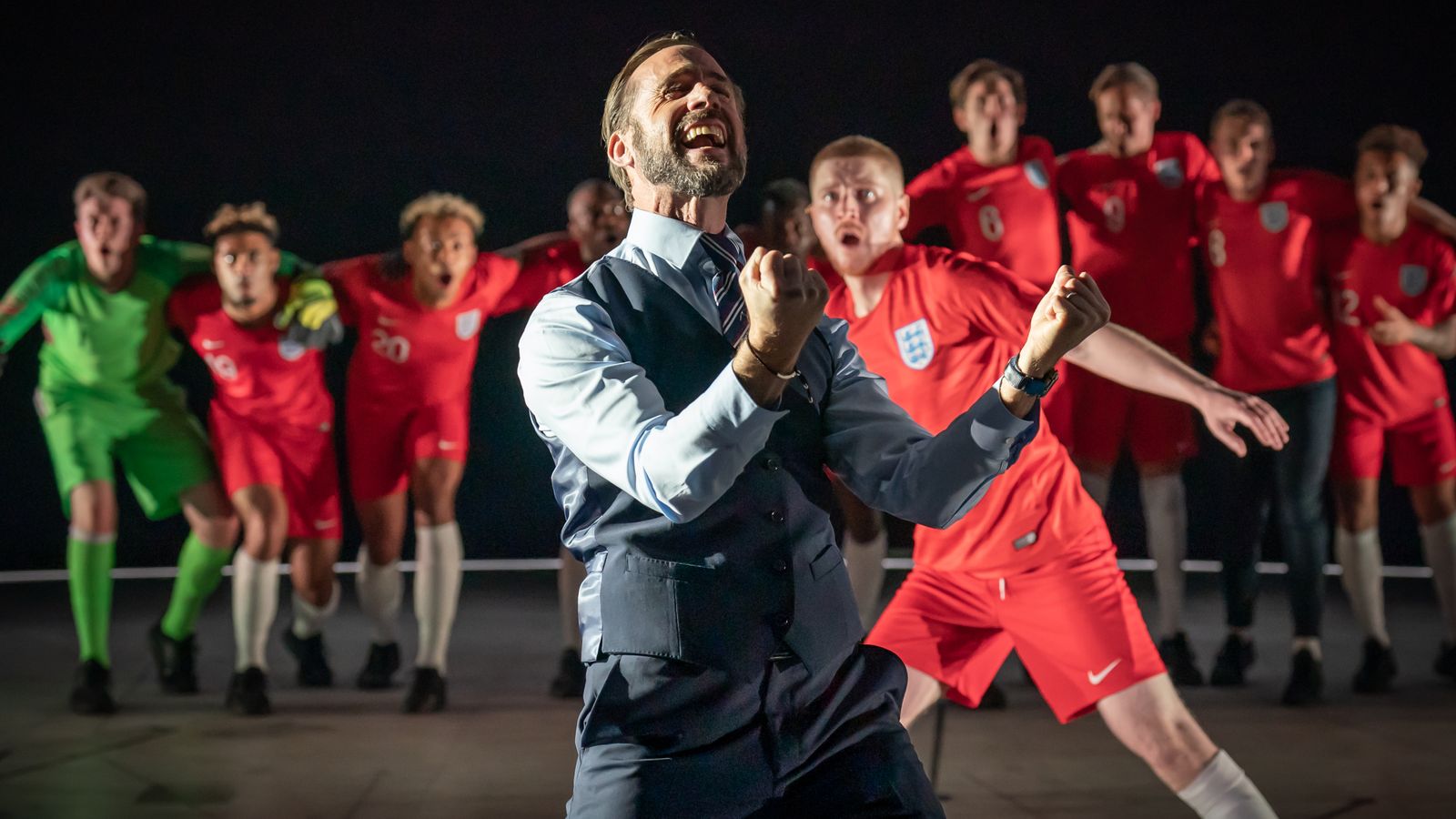
“Gareth is a hero to me, how I think he has changed the game.”
The highest of praise for England’s manager, from a superstar of stage and screen.
Joseph Fiennes plays Gareth Southgate in the play ‘Dear England’, which has this week embarked on a landmark West End run. It’s the first drama to be staged at the Prince Edward Theatre since World War II.
It’s the story of the England men’s football team, since Southgate took charge in 2016, how he has changed the entire ethos of the squad, and made the nation fall in love with the men’s national team once more.
“Gareth is kind of unique,” says Fiennes. “I think he has challenged maybe what other managers perpetuated, which was fear and masculinity – getting out there and winning.”
Fiennes’ portrayal of Southgate is uncanny. He has the same body shape, the same beard, the waistcoat – of course. But, most importantly, he has captured the England manager’s essence – his mannerisms, his firm but gentle interaction with the players.
“I was definitely nervous about portraying someone who is so well known and in the news every day,” Fiennes explains. “But the play itself is a little fantastical.
“For me, beyond mannerisms, the mimicry and waistcoats – which is great for the audience by the way, because they can go ‘Ooh, that’s Gareth’ or ‘Oh yes, that’s Harry Kane’ – then the play has other themes beneath that.
“I think Gareth’s critical juncture was 1996 (when he missed a penalty against Germany in the Euros semi-final at Wembley).
“And for me it’s fascinating how that changed him, how he grew from that, and how that led to the person and the manager he is today. It’s about all those worst things we think can happen to us, are mysteriously there to forge a new you.”
More than 75,000 people saw the show at the National Theatre over the summer – that’s earned ‘Dear England’ a West End run, which has just started, and continues until the new year.
The play was written by one of the hottest prospects in UK and American theatre and TV – James Graham.
He has written numerous plays that have been staged in the West End and on Broadway, and is currently filming the second series of the BBC drama ‘Sherwood’, which he also wrote.
“We all have a relationship with the England football team,” Graham purrs.
“We have all watched the journey that Gareth and those players have been on for the past few years. It’s been an extraordinary transformation.
“We can all remember what it felt like in 2016, losing to Iceland, collapsing out of the Euros, Sam Allardyce’s one single game – it felt like a nadir in the sport and we wondered how the hell we were going to get out of it.
“So the fact that Gareth has done it so quickly, so beautifully, focused on things managers haven’t focused on before – masculinity, culture, fear, vulnerability, identity, history – it’s compelling!”
Dervla Kirwan – who is well-known to UK television audiences and has won a National Television award for her work in Ballykissangel – plays Dr Pippa Grange, the psychologist Southgate brought in to work with the England squad in the build up to the 2018 World Cup.
Dr Grange was rarely seen by the media, but had a big impact in changing the mentality of the players behind the scenes.
“Perhaps her invisibility wasn’t just to do with misogyny in football, it might also have been personal choice,” Kirwan explains.
“Because women get such a negative and violent response on social media and in the press – maybe that was her way of protecting herself. And she works in a very private way, to pull the players aside and talk to them, and be like a horse-whisperer or a football-whisperer.
“But all kudos to Southgate for getting her in. He recognised there was an imbalance, and he needed a female presence.”
Inevitably, England’s chequered history with penalties in major tournaments is central to the drama. From Southgate’s miss in Euro 1996, via the historic win over Colombia in the 2018 World Cup, to Harry Kane’s uncharacteristic failure from 12 yards in Qatar 2022. All are dramatised in the full glare of the theatre audience.
“Our play is also learning about fear and looking fear in the face, looking at the keeper, turning away and taking your time, and being prepared,” Fiennes says.
“And that’s where England seemed to have been let down in all the great games – penalties. So, there was a great reformation that took place; gentle and with a lot of participants.”
Another central theme of the drama focuses on the England fans learning to love the England team again. Spending time with the cast and crew, it’s very clear that – even those that aren’t football fans – are admirers of Southgate and his brave, outspoken players.
“I used to have a very negative perspective of footballers” Kirwan admits. “I did think they were prima donnas, I did see them as overpaid.
“This play has allowed me to understand them on a human level. They’re all so young, they’re 18. They’re babies.
“And they have the world’s eyes on them, plus the negativity that brings on social media. It’s tough. I don’t think all the money in the world is enough when you’ve grown up as a kid just wanting to play football.”
While the play has a beginning, a middle and an end – so does Fiennes’ narrative, which makes it clear that the end of Southgate’s story has yet to be written.
If Dear England’s message of new-found optimism is accurate, then the journey from Euros despair in 2016 should culminate in Southgate and his squad lifting the Euros trophy in Germany next summer.
That would be some theatrical finale.
Dear England is on at the Prince Edward Theatre now until January 13 2024. Book your tickets at DearEnglandOnStage.com.
Sky Arts is a proud partner of the National Theatre, part of Sky’s commitment to supporting the UK’s creative and cultural economy.




